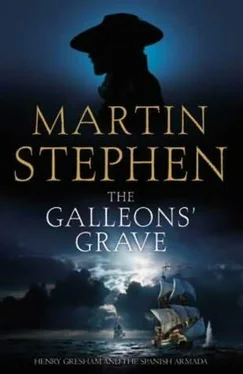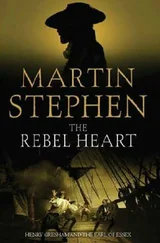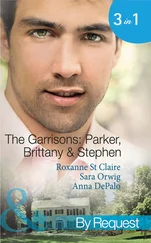Martin Stephen - The galleon's grave
Здесь есть возможность читать онлайн «Martin Stephen - The galleon's grave» весь текст электронной книги совершенно бесплатно (целиком полную версию без сокращений). В некоторых случаях можно слушать аудио, скачать через торрент в формате fb2 и присутствует краткое содержание. Жанр: Исторический детектив, на английском языке. Описание произведения, (предисловие) а так же отзывы посетителей доступны на портале библиотеки ЛибКат.
- Название:The galleon's grave
- Автор:
- Жанр:
- Год:неизвестен
- ISBN:нет данных
- Рейтинг книги:4 / 5. Голосов: 1
-
Избранное:Добавить в избранное
- Отзывы:
-
Ваша оценка:
- 80
- 1
- 2
- 3
- 4
- 5
The galleon's grave: краткое содержание, описание и аннотация
Предлагаем к чтению аннотацию, описание, краткое содержание или предисловие (зависит от того, что написал сам автор книги «The galleon's grave»). Если вы не нашли необходимую информацию о книге — напишите в комментариях, мы постараемся отыскать её.
The galleon's grave — читать онлайн бесплатно полную книгу (весь текст) целиком
Ниже представлен текст книги, разбитый по страницам. Система сохранения места последней прочитанной страницы, позволяет с удобством читать онлайн бесплатно книгу «The galleon's grave», без необходимости каждый раз заново искать на чём Вы остановились. Поставьте закладку, и сможете в любой момент перейти на страницу, на которой закончили чтение.
Интервал:
Закладка:
'Fear not, sir!' she exclaimed in a voice strangely deep for a woman, 'this is the hand of friendship I extend to you, not the fist of war.'
A gale of laughter swept the Court, far more than the feeble joke deserved. So it was not her best. Yet the Court knew of old that a rough earthiness could cut into the formality and pretence of Court life at any moment, as the spirit of her father, Henry VIII, possessed her. They might hate her when she was not there, blame her increasingly for not leaving England with a clear heir, but here, in the splendour of her own Court, it was not difficult to see why she had survived so long and so well.
Gresham found himself dancing with the Queen before he realised it. The intricate moves had required his whole attention, and it was not until he felt the stink of the Queen's foul breath behind him that he realised the next round would place him in partnership with her. They swept towards each other, the Queen still excellent in the slower dances. Her face was unnaturally white, the pancake-layer of make-up beginning to loosen like bad plaster as the sweat and exertion of the evening wore on. Her eyes were small, narrow, as they had been on the portraits of her father, Gresham noted. She had favoured the Earl of Essex all evening, to the discomfiture of Leicester. Now she fixed her eye on Gresham, still coping apparently effortlessly with the intricacies of the dance.
'Have you spent all that money yet, Master Gresham?' she asked. She never met him without referring to his wealth, nor let an hour pass without referring to her own poverty. 'Have you spent your inheritance on the things young men spend their money on?'
'I would willingly spend it on gifts for Your Majesty,' said Gresham, a sinking feeling in his stomach. This was not the moment to cannon back into the Earl of Somerset or step on the most powerful set of toes in England, 'were it not for the fact that the greatest fortune on earth could not improve on the beauty that nature and providence gave Her Majesty.'
They moved back in stately movement for a moment, then came together again. The dance required them to walk between the other couples, fifteen or twenty in number, in two separate stages. Gresham was vaguely aware of several glances of hatred directed at him as he escorted the Queen up the line.
'Your words are impressive, young man,' said the Queen, 'and even more so because there is even a slight chance you thought of them yourself.'
Ouch; It never did to underestimate the Queen, whose capacity for flattery was only equalled by her ability to perceive when she was being flattered.
'Have care, young man,' the Queen added, her face expressionless. The dance had brought them face to face for a brief moment. 'There are those who despise you as an upstart in my Court.'
And there are those who despise you, Your Majesty, thought Gresham, as the bastard daughter of the whore Anne Boleyn, who many thought a witch. Nonetheless…
'Thank you, Your Majesty,' said Gresham humbly, in the few seconds remaining. 'Yet sometimes upstarts are better survivors than those whose entry into life was made easy for them.'
My God! What had he said! He might as well have told her that bastards should stick together! The Queen's eyes were fathomless, unreadable. They parted with the brief, formal bows the dance demanded, his deep and low, hers conventional, neither so brief as to be rude nor so long as to excite attention.
'Well, that was interesting.' George had grabbed a table in a room off the Hall, found from somewhere some scraps of food and a half-decent bottle. No servant could sit at table with their master and so Gresham had sent Mannion off to scour the kitchens, where past experience suggested he would find far better food and drink, and probably ruin a kitchen-maid in the bargain. There were plenty of available women above-stairs, for that matter, but the encounter with the Queen had rather knocked the stuffing out of Gresham.
'What was interesting?' asked Gresham. 'Her breath curdles milk inside the cow at fifty paces, and you never know from one minute to the next if it's an axe or a glove in her hand. I-'
‘Not that, fool,' said George. 'Who cares about you? I mean the way the Ambassador was received. Didn't you notice, you great idiot?'
'Notice? Notice what?' said Gresham. Perhaps he would get drunk after all, since remaining sober didn't seem to help.
'The Queen was not there to greet the Ambassador, nor to hear the speech of welcome. All perfectly acceptable in diplomatic terms, of course, but it demotes him immediately two or three places below a Prince or equivalent. No, what it shows is that this evening isn't about the Queen listening to the Ambassador, as I feared. Rather, it's to impress him. It's a show of force — or rather a show of wealth. He's meant to go back to the Netherlands and tell them how much money England has, how brilliant its Court is.'
'But that doesn't make sense,' said Gresham, grappling with the issues. 'All it means is that they'll ask us for more money and more men, when all the Queen can do is say that she hasn't got the income to hold body and soul together.' Spend a bit less on your dresses, lady, thought Gresham.
'Of course it makes sense!' said George, exasperated at his friend's inability to see what was obvious. 'While the Netherlands keep on fighting the Duke of Parma, he's hardly going to want to send half his army over to England, is he? It's leaving him completely exposed. If the Protestants think England can keep pouring money and troops into their cause, they're much more likely to keep fighting and not make a deal with Parma or Spain. Don't you understand anything about politics?'
No, thought Gresham, I do not. Or at least not enough. And as the waters get deeper and my involvement greater with every minute, I must learn. Even the most dedicated survivor needs lessons in survival
Chapter 2
March-April, 1587 Granville College, Cambridge
The choir were singing in the Chapel. There were only a handful of them, a symbol of the resurgence in the fortunes of Granville College, but they were good. The beautiful, delicate soaring voices escaped the half-open door and drifted over the College like a flock of swifts.
Things had to be bad if the music failed to move Henry Gresham. A young man who had already been hurt too often by a passion for people, he channelled the fiery avalanche of his emotions into the safe release of music. But today he gazed vacantly out of the latticed window, down to the courtyard. Two rooms to himself was a great luxury indeed in Cambridge. Most Fellows shared their room with students, hiring out truckle beds. Outside, what little peace there ever was in Cambridge was being destroyed by the noise of the men building the new wing, the first sign of the money Gresham was pouring into his old College. Two weeks ago the entire scaffolding had come clattering down, with five men on it. One had broken both legs, another an arm. The students had sawn through the ropes holding the wooden poles in place the night before.
The black mood tore at his mind, the face of the man he had murdered in the meadows returning and swimming up at him.
'Snap out of this!' growled Mannion. He was worried. What was it in Gresham that made him bottle so much up? How many people realised the truth about the laconic, assured and confident young man who strode through Cambridge and London as if he did not have a care in the world? It was simply a mask, an imposition of outer calm over a heaving maelstrom of clashing moods and an almost gross sensitivity. And apparently it was only Mannion who was allowed to see beneath this mask.
'What is there to snap out of it for? said Gresham, bleakly.
Mannion was annoying. Henry Gresham did not want people to care for him. He had been born a bastard, his mother never named, a startling by-blow from the success story that was the life of the great Sir Thomas Gresham. To everyone's surprise Sir Thomas had acknowledged the child. But it had been a cold, clinical childhood. Then his father had died when Gresham was nine years old. He remembered thinking how lucky he was that he felt no urge to cry. He had seen other children cry at the death of a parent. It was a weakness to cry. Emotional attachments were a weakness. A person was better without that weakness. Stronger.
Читать дальшеИнтервал:
Закладка:
Похожие книги на «The galleon's grave»
Представляем Вашему вниманию похожие книги на «The galleon's grave» списком для выбора. Мы отобрали схожую по названию и смыслу литературу в надежде предоставить читателям больше вариантов отыскать новые, интересные, ещё непрочитанные произведения.
Обсуждение, отзывы о книге «The galleon's grave» и просто собственные мнения читателей. Оставьте ваши комментарии, напишите, что Вы думаете о произведении, его смысле или главных героях. Укажите что конкретно понравилось, а что нет, и почему Вы так считаете.












